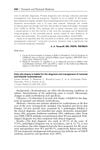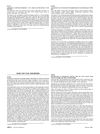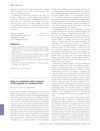
Antimalarial agents are effective for LPP, and intralesional steroids are effective for FFA.
 July 2018 in “British Journal of Dermatology”
July 2018 in “British Journal of Dermatology” Hair regrowth was seen in 83% of children with alopecia, immune system plays a role in the condition, and various treatments showed effectiveness for hair and nail disorders.

Different scalp and hair disorders are more common in certain ethnic groups, with the most common being androgenetic alopecia, which is treated with medications like minoxidil and finasteride.
[object Object]  January 2018 in “Springer eBooks”
January 2018 in “Springer eBooks” Cancer treatments targeting specific cells often cause skin, hair, and nail problems, affecting patients' lives and requiring careful management.
 November 2017 in “Research Journal of Health Sciences”
November 2017 in “Research Journal of Health Sciences” Skin infections and eczema were most common in all ages, acne in teens and young adults, and nutritional skin problems and infestations in children.
 January 2017 in “Springer eBooks”
January 2017 in “Springer eBooks” Over 40% of postmenopausal women experience hair loss, with treatments aiming to stop further loss and possibly thicken hair.
 January 2017 in “Springer eBooks”
January 2017 in “Springer eBooks” The document concludes that Cutaneous Lupus Erythematosus has different forms, is influenced by genetic and environmental factors, and can be treated with various medications, but more targeted therapies are needed.
 January 2017 in “Clinical approaches and procedures in cosmetic dermatology”
January 2017 in “Clinical approaches and procedures in cosmetic dermatology” Retinoids are effective for skin conditions like severe acne and psoriasis but must be used with caution due to potential side effects and risks during pregnancy.

Benign skin tumors need accurate diagnosis to ensure proper treatment.
 December 2016 in “British Journal of Dermatology”
December 2016 in “British Journal of Dermatology” The meeting highlighted the importance of genetic testing and multidisciplinary approaches in pediatric dermatology.
 April 2016 in “Journal of The American Academy of Dermatology”
April 2016 in “Journal of The American Academy of Dermatology” The study found that severe alopecia areata affects any age, treatments often give temporary results, and some factors predict worse outcomes.
 April 2016 in “Journal of The American Academy of Dermatology”
April 2016 in “Journal of The American Academy of Dermatology” People with certain allergic conditions or higher white blood cell counts have more severe hair loss, and treating hair and nail side effects early in melanoma therapy can improve quality of life.
 April 2016 in “Journal of The American Academy of Dermatology”
April 2016 in “Journal of The American Academy of Dermatology” Both atopy and eosinophilia are linked to more severe hair loss in people with alopecia areata.
 January 2016 in “Springer eBooks”
January 2016 in “Springer eBooks” Understanding drug interactions, side effects, and patient-specific factors is crucial for effective dermatological care.
 December 2015 in “Actas Dermo-Sifiliográficas”
December 2015 in “Actas Dermo-Sifiliográficas” Hair transplantation for Frontal Fibrosing Alopecia may work if the disease is inactive for 2 years and with ongoing treatment to maintain results.
 July 2015 in “Cambridge University Press eBooks”
July 2015 in “Cambridge University Press eBooks” Androgens like testosterone affect skin health and can lead to conditions such as acne and hair loss, with various treatments available.
 March 2013 in “Actas Dermo-Sifiliográficas”
March 2013 in “Actas Dermo-Sifiliográficas” The document concludes that there have been significant improvements in diagnosing and treating skin diseases, including melanoma, with new techniques and therapies.
 January 2012 in “Springer eBooks”
January 2012 in “Springer eBooks” Lupus can cause different skin problems, and treatments like quitting smoking and using certain creams or medicines can help.
 August 2010 in “Journal of The American Academy of Dermatology”
August 2010 in “Journal of The American Academy of Dermatology” The document explains the diagnosis and characteristics of woolly hair nevus and alopecia neoplastica.
 January 2010 in “The Year book of perinatal/neonatal medicine”
January 2010 in “The Year book of perinatal/neonatal medicine” Early skin biopsy helps diagnose and manage severe skin conditions in babies.
 January 2010 in “Elsevier eBooks”
January 2010 in “Elsevier eBooks” The document concludes that different types of hair loss have specific treatments, and early diagnosis is crucial for preventing permanent hair loss.
 December 2009 in “DergiPark (Istanbul University)”
December 2009 in “DergiPark (Istanbul University)” Check serum ferritin levels and total blood count for women with diffuse hair loss.
[object Object]  January 2009 in “Springer eBooks”
January 2009 in “Springer eBooks” The document concludes that treating skin conditions should include psychological care and a multidisciplinary approach is essential for effective management.
 January 2007 in “Journal of the American Academy of Dermatology”
January 2007 in “Journal of the American Academy of Dermatology” A 73-year-old man's grey-white hair turned dark brown after eczema treatment.
 August 2005 in “British journal of dermatology/British journal of dermatology, Supplement”
August 2005 in “British journal of dermatology/British journal of dermatology, Supplement” Melatonin may help treat hair loss and needs more research.
 March 2005 in “Journal of the American Academy of Dermatology”
March 2005 in “Journal of the American Academy of Dermatology” Bexarotene 1% topical gel helped some patients with alopecia areata regrow hair.
 July 1980 in “Journal of The American Academy of Dermatology”
July 1980 in “Journal of The American Academy of Dermatology” The conference concluded that understanding hair and nail disorders is important, iron deficiency may be linked to hair loss, and while some treatments for skin conditions are effective, they may have risks and high costs.
 April 1963 in “Archives of Dermatology”
April 1963 in “Archives of Dermatology” Dermatological conditions are complex and treatments often have mixed results.

Hair loss in African American women, caused by hair care, genetics, and environment, needs more research for better treatment.
July 1974 in “Archives of dermatology” The woman's widespread skin condition did not improve despite various treatments.





























